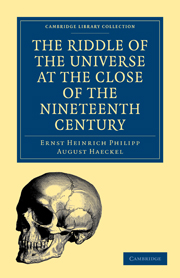Book contents
- Frontmatter
- Contents
- PREFACE
- AUTHOR'S PREFACE
- CHAPTER I THE NATURE OF THE PROBLEM
- CHAPTER II OUR BODILY FRAME
- CHAPTER III OUR LIFE
- CHAPTER IV OUR EMBRYONIC DEVELOPMENT
- CHAPTER V THE HISTORY OF OUR SPECIES
- CHAPTER VI THE NATURE OF THE SOUL
- CHAPTER VII PSYCHIC GRADATIONS
- CHAPTER VIII THE EMBRYOLOGY OF THE SOUL
- CHAPTER IX THE PHYLOGENY OF THE SOUL
- CHAPTER X CONSCIOUSNESS
- CHAPTER XI THE IMMORTALITY OF THE SOUL
- CHAPTER XII THE LAW OF SUBSTANCE
- CHAPTER XIII THE EVOLUTION OF THE WORLD
- CHAPTER XIV THE UNITY OF NATURE
- CHAPTER XV GOD AND THE WORLD
- CHAPTER XVI KNOWLEDGE AND BELIEF
- CHAPTER XVII SCIENCE AND CHRISTIANITY
- CHAPTER XVIII OUR MONISTIC RELIGION
- CHAPTER XIX OUR MONISTIC ETHICS
- CHAPTER XX SOLUTION OF THE WORLD-PROBLEMS
- INDEX
CHAPTER XV - GOD AND THE WORLD
Published online by Cambridge University Press: 05 August 2011
- Frontmatter
- Contents
- PREFACE
- AUTHOR'S PREFACE
- CHAPTER I THE NATURE OF THE PROBLEM
- CHAPTER II OUR BODILY FRAME
- CHAPTER III OUR LIFE
- CHAPTER IV OUR EMBRYONIC DEVELOPMENT
- CHAPTER V THE HISTORY OF OUR SPECIES
- CHAPTER VI THE NATURE OF THE SOUL
- CHAPTER VII PSYCHIC GRADATIONS
- CHAPTER VIII THE EMBRYOLOGY OF THE SOUL
- CHAPTER IX THE PHYLOGENY OF THE SOUL
- CHAPTER X CONSCIOUSNESS
- CHAPTER XI THE IMMORTALITY OF THE SOUL
- CHAPTER XII THE LAW OF SUBSTANCE
- CHAPTER XIII THE EVOLUTION OF THE WORLD
- CHAPTER XIV THE UNITY OF NATURE
- CHAPTER XV GOD AND THE WORLD
- CHAPTER XVI KNOWLEDGE AND BELIEF
- CHAPTER XVII SCIENCE AND CHRISTIANITY
- CHAPTER XVIII OUR MONISTIC RELIGION
- CHAPTER XIX OUR MONISTIC ETHICS
- CHAPTER XX SOLUTION OF THE WORLD-PROBLEMS
- INDEX
Summary
The idea of God in general. Antithesis of God and the world; the supernatural and nature. Theism and Pantheism. Chief forms of Theism. Polytheism. Tritheism. Ampitheism. Monotheism. Religious statistics. Naturalistic Monotheism. Solarism. Anthropistic Monotheism. The three great Mediterranean religions. Mosaism. Christianity. The cult of the Madonna and the saints. Papal Polytheism. Islam. Mixotheism. Nature of Theism. An extramundane and anthropomorphic God—a gaseous vertebrate. Pantheism. Intramundane God (nature). The hylozoism of the Ionic Monists (Anaximander). Conflict of Pantheism and Christianity. Spinoza. Modern Monism. Atheism.
For thousands of years humanity has placed the last and supreme basis of all phenomena in an efficient cause, to which it gives the title of God (deus, theos). Like all general ideas, this notion of God has undergone a series of remarkable modifications and transformations in the course of the evolution of reason. Indeed, it may be said that no other idea has had so many metamorphoses; for no other belief affects in so high a degree the chief objects of the mind and of rational science, as well as the deepest interests of the emotion and poetic fancy of the believer.
A comparative criticism of the many different forms of the idea of God would be extremely interesting and instructive; but we have not space for it in the present work. We must be content with a passing glance at the most important forms of the belief and their relation to the modern thought that has been evoked by a sound study of nature.
- Type
- Chapter
- Information
- Publisher: Cambridge University PressPrint publication year: 2009First published in: 1900



